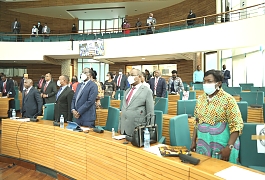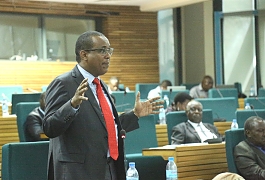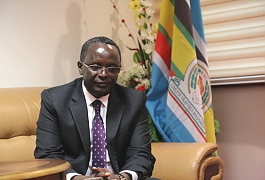EALA has today passed the One Stop Border Posts Bill, 2012, paving way for it to become Community Law if assented to by the EAC Heads of State. The object of the Bill, initiated by the EAC Council of Ministers, is to provide for the establishment of One Stop Border Posts (OSBP) in the Community in order to facilitate trade through the efficient movement of goods and people within the Community.
Under the arrangement, Partner States shall implement one stop border processing arrangements by establishing and designating control zones at the respective border posts.
The Bill in addition seeks to extend Partner States’ national laws relating to border control officers of adjoining Partner States permitting their free movement within the controlled zone(s) in the performance of their duties, without producing passports, but by simply producing their appropriate identity. The Bill makes provision for the application of border control laws and provides for institutional arrangements in the co-ordination and monitoring of the one stop border posts. In so doing however, the Bill does not affect the rights of any adjoining Partner State(s) to take temporary measures in the interest of defence, security, public safety and public order.
Common Border posts designated in the EAC as One Stop Border Posts include the Taveta-Holili border and the Namanga border (Kenya-United Republic of Tanzania), Busia and Malaba borders (Kenya – Uganda) and the Kanyaru-Akanyaru border (Burundi-Rwanda). Others are the Mutukula border (United Republic of Tanzania-Uganda), Gasenyi-Nemba border (Burundi, Rwanda) and Lungalunga-Horohoro border (Kenya – United Republic of Tanzania).
Debate on the Bill was preceded by the tabling of a Report of the Committee on Communications, Trade and Investment presented by the Chairperson, Hon Dan Kidega. The report underscores the need for Partner States to develop, upgrade and modernise the required infrastructural facilities and to enhance technological advancement to enable efficient and effective implementation of the Bill. The report was filed as a result of public hearings held in the Partner States on March 6-12, 2013 and April 11, 2013 to collate views from different stakeholders. The Committee at that point received views from customs officials, clearing and forwarding agents and members of the business community among others.
The report urges the Council of Ministers to conduct sensitisation programs on the OSBP to the populace and to fast-track the process of processing the needed regulations. ‘It is true the OSBP has been operating on some border points on bilateral arrangements within the Partner States; therefore the law is critical because it provides a regional legal framework’, the Report said in part.
At debate time, Hon Shy-Rose S. Bhanji commended the Council of Ministers for initiating the Bill noting that it would reduce the unnecessary bureaucracies at the border posts. ‘This is a major achievement and we want the capacities of the personnel at the borders to be built so as to enhance service delivery’, the legislator remarked. Hon Mike K. Sebalu noted that it was necessary for the OSBP initiative to be rolled out to all borders when finances permit so as to demystify free movement. ‘Integration is people centred and we must make the processes easy to implement the Common Market Protocol’, he noted. Hon Joseph Kiangoi said the Bill would enable the region to open up for trade terming the region ‘a major economic bloc’ in the continent and bloc. Hon Frederic Ngenzebuhoro said the implementation of the Bill would reduce corruption and significantly eliminate bribes. Hon Mukasa Mbidde and Hon Abubakar Zein also rose in support of the Bill.
The Chair of the EAC Council of Ministers, Hon Shem Bageine remarked that the spirit of working together (EALA and the Council of Ministers) would be the hallmark towards ensuring integration. He reiterated the Council’s pledge to put in place regulations to support the Act when implemented. “It is our desire and aspiration for example that during the implementation of the Act, the terms and conditions of staff working together to facilitate the OSBP are harmonised to retain staff of high calibre”, the Minister stated.
The Bill successfully passed through the second reading with amendments during the Committee Stage before it was passed for its third reading.
Tomorrow (Wednesday, April 24, 2013), the Chair of the Summit of EAC Heads of State, President Yoweri Museveni is expected to deliver the State of EAC Address to the Assembly.
-End-
For more Information, contact: Bobi Odiko, Senior Public Relations Officer; East African Legislative Assembly; Tel: +255-27-2508240 Cell: +255 787 870945, +254-733-718036; Email: bodiko@eachq.org Web: https://www.eala.org Arusha, Tanzania Number in Kigali +250783452347




